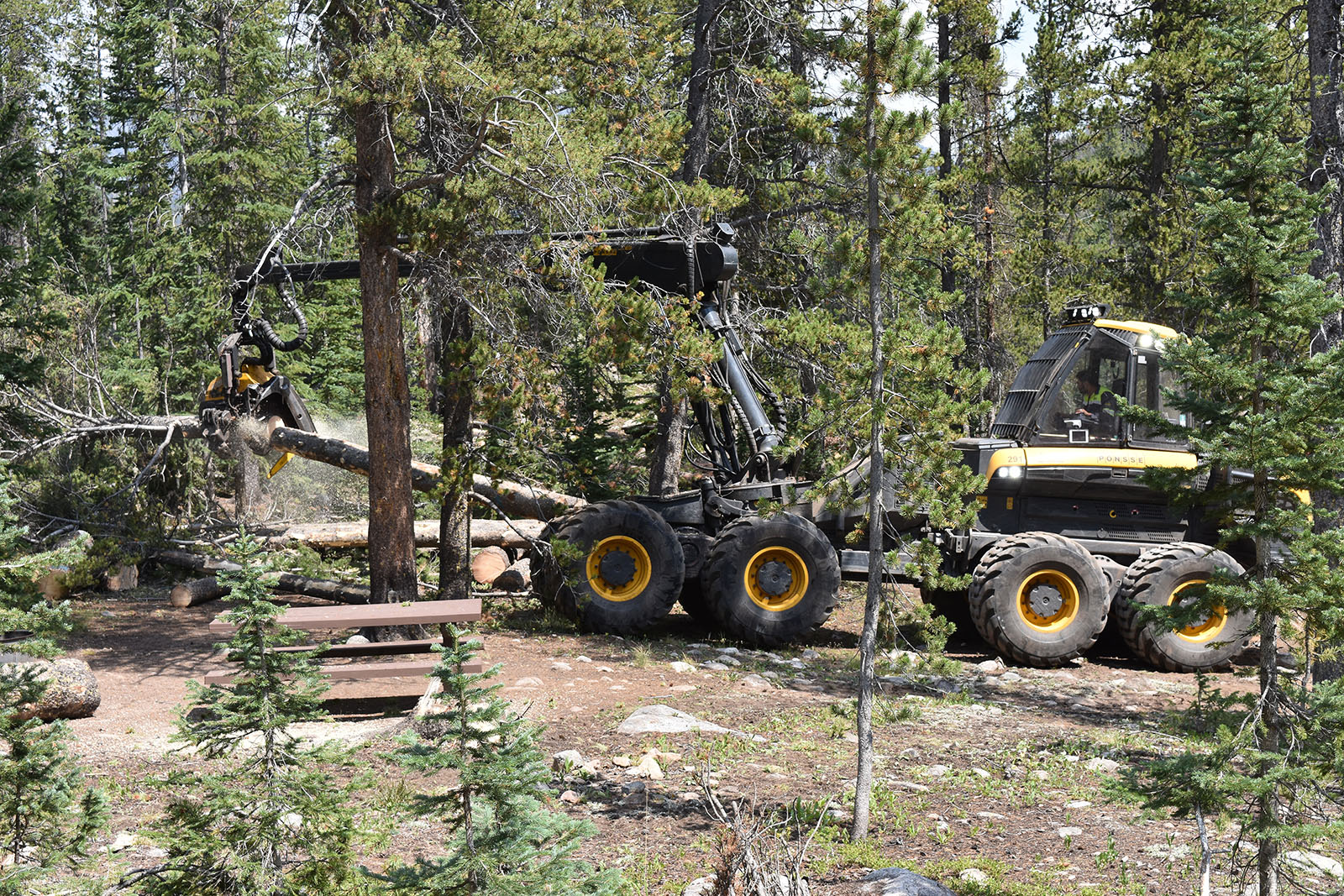The project is the first of its kind in Colorado.
The Monarch Pass Forest and Watershed Health Project has entered a new phase, and Miller Timber Services has begun work to remove beetle-kill trees on the steep slopes south of U.S. Highway 50 using cut-to-length (CTL) logging equipment.
Led by the U.S. Forest Service and the Arkansas River Watershed Collaborative (ARWC), the Monarch Pass project is the first in Colorado to employ CTL machinery, which provides a less expensive, less damaging alternative to traditional methods of logging on steep slopes.
U.S. Forest Service Silviculturist Alex Rudney said the Monarch Pass forest has experienced “about 90 percent mortality of the spruce trees 5 inches (in diameter) and bigger across the entire project area.” The purpose of the project, he added, is to:
- Reduce beetle infestation.
- Improve forest resiliency.
- Reduce fuel loading to minimize the potential for and impacts of wildfire.
- Provide for firefighter and public safety.
- Improve watershed health.
- Protect infrastructure, including power transmission lines.
- Improve aquatic ecosystem health.
Andy Lerch, ARWC lead forester and project manager for the Monarch work, said Miller Timber Services will remove the beetle-kill trees from the side of the mountain starting south of Monarch Mountain Resort and extending to the gondola at the top of the pass. Miller employees have already begun harvesting dead trees at Monarch Park Campground.
Lerch said work will progress from the campground up onto the mountainside with a goal of treating 185 acres this year, about half of the project area. The window for performing the work is roughly two months each year, from August until snowfall prevents further progress, and Lerch said the plan is to complete the work in two years.
Based in Oregon, Miller Timber Services specializes in CTL logging using Ponsse equipment developed and manufactured in Finland.

Lerch said CTL equipment was first used in the U.S. in the Northeast and Great Lakes regions, but Miller realized the value of this equipment for operating in the more extreme topography in the West. The company pioneered CTL logging in the Northwest and is now demonstrating its value at Monarch Pass.
The eight-wheeled CTL machinery can operate on slopes as steep as 70 percent with the optional use of tracks and a winch with cable secured at the top of the slope.
Lerch said the configuration helps reduce the impact to soils by spreading out the weight of the machinery, thereby reducing soil compaction. The winch assist and tracks prevent spinning tires from digging into the soil, and placing slash along the machine’s path also helps reduce soil damage. “We’re trying to have the lightest touch possible.”
A CTL harvester is capable of harvesting a 60-foot swath of timber as it descends the mountain slope, removing limbs and, as the name suggests, cutting logs into standard sawmill lengths. Once the harvester has turned the dead trees into logs, a forwarder will travel the same paths to load the logs and haul them to a convenient location for loading onto trucks.
“Things are going to look different, but this will help promote the next generation of the forest,” Lerch said, noting that young trees unaffected by the spruce beetles will remain on the mountainside. “Over time the project area will change to a more natural look.”
“Miller Timber Services is honored and proud to partner with the Arkansas River Watershed Collaborative and the U.S. Forest Service to reduce the fire danger and restore health to this forest,” said Matthew Mattioda, chief forester with Miller Timber Services. “This is an important project for the community and the downstream water users, and we are excited to be a part of the solution.”
Chelsey Nutter, ARWC executive director, secured more than $600,000 in matching funds for the project from multiple partners, including the Colorado Water Conservation Board, the Upper Arkansas Water Conservancy District, Chaffee County, the City of Salida, the Town of Poncha Springs, the Town of Buena Vista, the Pueblo Board of Water Works, Colorado Springs Utilities and Trout Unlimited.
Rudney leveraged those matching funds to obtain $900,000 in Forest Service funding.
Nutter noted multiple benefits of the project for local communities, including:
- Protection of public water supplies.
- Mitigation of catastrophic erosion in the event of a forest fire.
- Protection of water, power and transportation infrastructure.
- Economic development.
“Most of our critical water resources have these steep slopes around them,” said Nutter, noting the importance of treating those slopes to help minimize the adverse effects that a wildfire would have on local water supplies.





